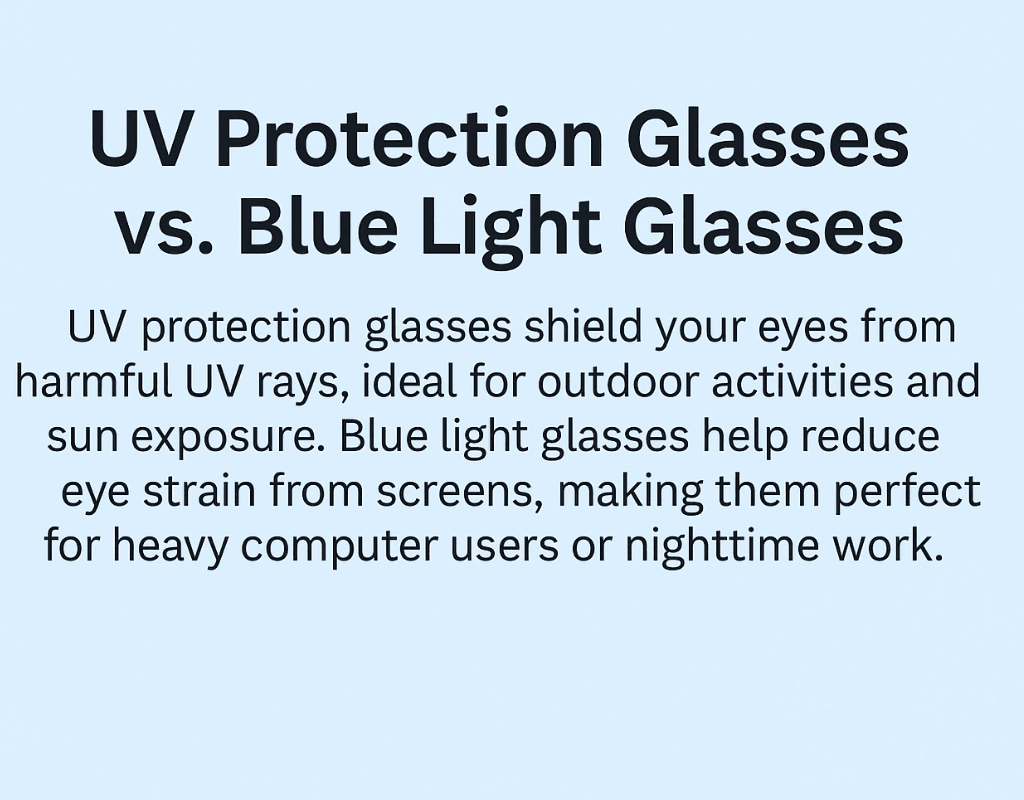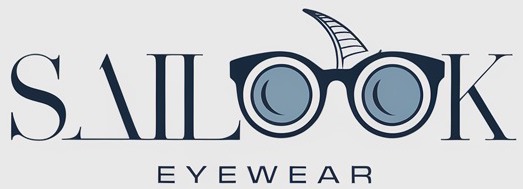When it comes to eye health, choosing the right pair of glasses can be a game-changer. UV protection glasses and blue light lenses serve distinct purposes, but how do you decide which one is best for you? In this article, we’ll break down the differences, the benefits of each, and help you determine which type of lens is right for your needs. Let’s dive in and explore the key factors you need to consider when choosing between UV protection glasses and blue light lenses.

1. What is the Difference Between UV Protection Glasses and Blue Light Glasses?
Choosing the right eyewear is crucial for protecting your eyes. But what’s the real story when it comes to UV protection glasses versus blue light glasses? Both lenses provide eye protection, but they work in different ways. UV protection glasses shield your eyes from harmful ultraviolet (UV) rays, while blue light glasses block high-energy visible (HEV) light emitted from digital screens.
Ready for the good part? Let’s break down how each type works:
- UV protection glasses are designed to protect your eyes from UV rays, which can lead to long-term damage, such as cataracts or macular degeneration.
- Blue light glasses focus on reducing eye strain, fatigue, and potential sleep disruptions caused by prolonged exposure to blue light from digital devices.
Here’s the kicker—while UV protection glasses are most important when outdoors, blue light glasses are essential for people who spend hours in front of screens. Both lenses are necessary for different situations. It’s all about finding the right fit for your lifestyle.
Now, let’s dive deeper into each of these glasses.
2. How Do UV Protection Glasses Work?
UV protection glasses are designed to block ultraviolet rays. These rays are invisible but can be harmful over time. UV rays come from the sun and can penetrate the eye, leading to various eye problems, such as cataracts and other forms of eye damage.
What’s the science behind this? UV protection lenses use special coatings or materials that absorb or reflect UV radiation, preventing it from reaching your eyes. This is especially important when you’re outdoors, where the sun’s rays are most direct.
Many UV protection lenses are made from materials like polycarbonate or Trivex, which naturally block UV radiation. This ensures your eyes are protected without the need for additional coatings. These lenses are also lightweight and durable, making them an excellent choice for daily use.
Here’s an example: When hiking or skiing, UV protection glasses are vital because the higher altitudes expose you to more UV radiation. Without these glasses, you risk damage to your eyes.
Let’s look at some stats on UV exposure:
| UV Exposure Source | Percentage of Exposure |
|---|---|
| Direct sunlight | 80% |
| Reflected sunlight | 20% |
| Indoor lighting | 10% |
3. How Do Blue Light Glasses Work?
Blue light glasses protect your eyes from blue light emitted by digital screens, such as those on computers, smartphones, and TVs. This light, which falls in the high-energy visible spectrum, is known to cause eye strain, fatigue, and even sleep disturbances.
What’s the science behind blue light? Our eyes are not equipped to filter out blue light efficiently, which means prolonged exposure can lead to digital eye strain. Blue light glasses work by filtering out the harmful portion of the spectrum, allowing you to look at screens for longer without feeling discomfort.
Ready for the good part? Studies show that people who use blue light blocking glasses report fewer instances of headaches, eye fatigue, and disrupted sleep patterns. These lenses are particularly useful for individuals who work long hours in front of a computer screen.
What’s the benefit? Using blue light glasses regularly can help reduce eye strain, improving productivity and comfort while working or enjoying digital entertainment.
Check out this comparison table of the effects of blue light:
| Blue Light Effect | Impact on Eyes |
|---|---|
| Eye strain | Fatigue and discomfort |
| Disrupted sleep | Difficulty sleeping |
| Reduced focus | Decreased concentration |
4. Why Should You Consider UV Protection Glasses?
UV protection glasses are essential for eye health, particularly when you’re outdoors. But here’s the kicker… UV rays can lead to serious eye conditions over time, including cataracts, macular degeneration, and skin cancer around the eyes.
How do they help? UV protection glasses block 100% of harmful UV rays, shielding your eyes from long-term damage. These glasses are especially important for people who spend a lot of time outside, such as athletes, outdoor enthusiasts, and anyone who enjoys spending time in the sun.
Let’s explore how UV protection glasses benefit different activities:
- For athletes: When you’re running or cycling, UV protection is crucial to prevent eye fatigue and long-term damage.
- For outdoor workers: People who work outdoors are exposed to the sun’s harmful rays for extended periods, making UV protection a must-have.
- For kids: Children’s eyes are more sensitive to UV rays, so wearing UV protection glasses can prevent damage from a young age.
The statistics are clear: prolonged exposure to UV rays without protection can cause irreversible eye damage. Investing in UV protection glasses can help ensure long-term eye health.
| Activity | UV Protection Needed |
|---|---|
| Hiking and skiing | High |
| Running and cycling | High |
| Work outdoors | High |
| Outdoor sports | High |
5. Why Should You Consider Blue Light Glasses?
Blue light glasses are becoming increasingly popular in today’s digital world. But what’s the real story? Blue light exposure from screens can cause eye strain, headaches, and even interfere with your sleep cycle. Blue light glasses work by filtering out the harmful blue light emitted by devices, reducing these negative effects.
Let’s dive into why blue light glasses are essential:
- For screen time: People who work long hours on digital devices can experience discomfort and eye strain. Blue light glasses help minimize this strain.
- For better sleep: By blocking blue light, these glasses can improve sleep quality by preventing disruption to your circadian rhythm.
- For enhanced focus: Reducing eye fatigue allows you to maintain better concentration, improving productivity in work and study.
Example: A study conducted by the National Sleep Foundation found that 60% of participants experienced difficulty sleeping after using digital devices before bed. Blue light glasses help mitigate this effect, leading to better rest.
| Digital Device Use | Effect on Sleep |
|---|---|
| Less than 2 hours | Minimal impact |
| 2-4 hours | Moderate impact |
| 4+ hours | High impact |
6. Are UV Protection Glasses Necessary for Indoor Use?
UV protection glasses are typically associated with outdoor activities, but here’s the kicker—you can still be exposed to UV rays indoors. UV rays can penetrate windows and reflect off various surfaces, making UV protection glasses just as important indoors as they are outside.
What’s the science behind this? While indoor lighting does not produce significant amounts of UV radiation, sunlight that comes through windows still carries UV rays. This exposure can add up over time, especially if you spend a lot of time near large windows or if you drive frequently, as car windows don’t completely block UV light.
Ready for the good part? If you’re spending long hours near a window or in a room with lots of sunlight, UV protection glasses can help prevent potential long-term damage. Over time, repeated exposure can contribute to the development of cataracts, macular degeneration, and other serious eye conditions.
Here’s a quick breakdown of UV protection indoors:
| Location/Activity | UV Protection Needed | Explanation |
|---|---|---|
| Inside the house | Moderate to High | UV rays penetrate windows, especially in areas with direct sunlight. |
| Office spaces | Moderate | UV exposure is minimal but still present, especially with large windows. |
| In the car | High | Windows provide some UV protection, but not enough to prevent all exposure. |
| Outdoor spaces | Very High | Direct sunlight and higher UV exposure in open spaces. |
7. Are Blue Light Glasses Necessary for Indoor Use?
With the rise of digital devices, blue light glasses have become a staple for many who spend long hours in front of screens. But do you really need them indoors? Here’s the kicker—blue light glasses are highly recommended for anyone working with screens for extended periods, and this applies to both indoor and outdoor settings.
What’s the real story? Blue light is emitted from digital screens, fluorescent lights, and even some LEDs, and it can cause significant eye strain and discomfort. Since most people spend their workday indoors, exposure to blue light is inevitable. It can lead to discomfort, headaches, and disrupted sleep patterns, particularly if you use digital devices late into the evening.
Ready for the good part? Blue light glasses can filter out up to 50% of the harmful blue light emitted from screens, reducing digital eye strain and improving focus and sleep quality.
Check out this comparison between blue light exposure in different environments:
| Environment | Blue Light Exposure Level | Effect on Eyes |
|---|---|---|
| Digital screens (phone, computer, TV) | High | Eye strain, headaches, disrupted sleep |
| Fluorescent lighting | Moderate | Causes discomfort and potential long-term strain |
| LED lighting | Moderate to High | May contribute to eye fatigue and discomfort |
8. What Are the Benefits of UV Protection Glasses for Outdoor Activities?
When you’re outdoors, UV protection glasses become essential. UV radiation is strongest outside, and prolonged exposure can lead to long-term eye damage. What’s the real story? UV protection glasses help prevent this damage by blocking harmful rays, which reduces the risk of cataracts, macular degeneration, and other eye diseases.
Here’s the kicker—UV rays don’t just affect your skin; they can also harm the delicate tissues in your eyes. That’s why it’s crucial to wear UV protection glasses during activities such as hiking, skiing, or cycling, especially in high-altitude areas where UV rays are more intense.
Let’s look at how UV protection glasses help in outdoor environments:
- For outdoor sports: Protects against sun damage during prolonged exposure.
- For driving: Reduces UV exposure while on the road.
- For beachgoers and swimmers: Reflective surfaces like sand and water increase UV radiation exposure.
| Activity | UV Protection Importance | Reason |
|---|---|---|
| Skiing or snowboarding | Very High | Snow reflects UV rays, increasing exposure. |
| Hiking and outdoor sports | High | Prolonged exposure to UV rays can lead to damage. |
| Driving | Moderate | UV rays penetrate through car windows, causing exposure. |
| Beach activities | Very High | Water and sand reflect UV rays, increasing exposure. |
9. What Are the Benefits of Blue Light Glasses for Work and Study?
As we continue to integrate digital technology into our daily lives, blue light glasses are becoming more important, especially for work and study environments. But here’s the kicker—long hours spent looking at digital screens can cause significant eye strain, fatigue, and even sleep disturbances.
What’s the real story? Blue light from computers, smartphones, and tablets can lead to digital eye strain, a condition characterized by tired eyes, headaches, and blurred vision. By wearing blue light glasses, you can reduce these symptoms and improve your productivity.
Ready for the good part? Studies show that blue light blocking glasses help improve sleep quality by reducing blue light exposure in the evening. This makes them particularly beneficial for people who work or study late.
| Usage Duration | Effect on Eyes | Benefit of Blue Light Glasses |
|---|---|---|
| 1-2 hours | Minimal eye strain | No major effect |
| 3-4 hours | Moderate eye strain | Reduces discomfort and strain |
| 5+ hours | High eye strain and fatigue | Prevents headaches and improves focus |
10. How Can You Tell If Your Glasses Have UV Protection?
Identifying UV protection in your glasses is crucial for ensuring your eyes are shielded from harmful rays. Here’s the kicker—it’s not always obvious whether your glasses have UV protection, but there are several ways to check.
What’s the real story? UV protection glasses typically come with a special coating or use materials that block harmful UV rays. Many glasses come with UV protection labels or markings, while others can be tested using a UV light tester.
Ready for the good part? Look for glasses with a label indicating “100% UV protection” or “UV400,” which means they block all UV rays up to 400 nanometers.
| Label/Marker | UV Protection Level |
|---|---|
| 100% UV protection | 100% |
| UV400 | 100% |
| UV coating | Varies |
11. How Can You Tell If Your Glasses Block Blue Light?
Blue light blocking glasses come in various styles and coatings, but what’s the real story? It can be hard to tell if your glasses are filtering blue light without checking the lens quality or labeling. Many blue light blocking glasses use coatings that filter a specific portion of the blue light spectrum.
Ready for the good part? Look for blue light filtering technology in the product details. Many glasses will list the percentage of blue light blocked (typically between 30-50%) or feature a slight yellow tint to indicate that they filter out blue light.
| Glass Type | Blue Light Blocking Level |
|---|---|
| Basic sunglasses | No blue light protection |
| Blue light blocking glasses | 30-50% |
| Specialized lenses | 100% blue light protection |
12. Are UV Protection Glasses and Blue Light Glasses the Same Thing?
UV protection glasses and blue light glasses serve different purposes. What’s the real story? UV protection glasses are designed to block UV rays from the sun, while blue light glasses block the blue light emitted from digital screens.
Here’s the kicker—both are important for eye health, but they work in different contexts. UV protection glasses are essential for outdoor use, while blue light glasses are crucial for digital device users.
| Glass Type | Protection Focus | Ideal Use |
|---|---|---|
| UV Protection Glasses | Blocks UV rays | Outdoors, driving |
| Blue Light Glasses | Filters blue light | Screen use, indoors |
13. What Is the Best Type of Glasses for Protecting Your Eyes?
When it comes to choosing the best glasses, the answer depends on your needs. But here’s the kicker—both UV protection and blue light blocking lenses are necessary, depending on where and how you spend your time.
What’s the real story? If you spend a lot of time outdoors, UV protection glasses are essential. If you work or study on digital devices, blue light glasses are necessary. For comprehensive protection, consider combining both.
| Usage Environment | Best Glass Type | Reason |
|---|---|---|
| Outdoors | UV Protection Glasses | Protects from harmful UV rays |
| Office/Study | Blue Light Glasses | Reduces digital eye strain |
| Mixed use (indoor & outdoor) | Both UV and Blue Light Glasses | Offers complete eye protection |
14. How Do UV Protection Glasses Compare to Blue Light Glasses in Terms of Price?
Price is an important consideration when buying glasses. What’s the real story? UV protection glasses tend to be more expensive, as they require higher-quality materials and coatings. Blue light glasses are often more affordable, but they still vary based on brand and features.
Ready for the good part? On average, you’ll pay more for high-quality UV protection glasses, especially if you want additional features like polarization or scratch resistance. Blue light glasses can be found at various price points, but high-quality models typically start at a similar price range.
| Glass Type | Price Range | Additional Features |
|---|---|---|
| UV Protection Glasses | $50 – $250+ | Polarized, Scratch-resistant |
| Blue Light Glasses | $20 – $150 | Blue light filtering coating |
15. Conclusion: Which Glasses Should You Choose for Your Eye Protection?
In conclusion, UV protection glasses and blue light glasses both serve vital roles in protecting your eyes from different types of damage. What’s the takeaway? UV protection glasses are best for outdoor use, while blue light glasses are perfect for screen-heavy tasks. Consider combining both types for comprehensive protection, ensuring your eyes are shielded from both UV rays and blue light exposure.
Are you ready to invest in eye protection? Choose the right glasses based on your needs and ensure your eyes remain healthy and comfortable for years to come.
FAQ Section
Q1: What is the difference between UV protection and blue light lenses?
A1: UV protection glasses block harmful ultraviolet rays, while blue light lenses protect against high-energy visible blue light emitted by digital screens.
Q2: How do UV protection glasses protect your eyes?
A2: UV protection glasses filter out UV radiation that can damage the cornea, lens, and retina, preventing long-term eye issues like cataracts.
Q3: Are blue light glasses effective for reducing eye strain?
A3: Yes, blue light glasses reduce digital eye strain by blocking the blue light emitted from screens, helping to alleviate discomfort.
Q4: Can you use blue light glasses while outside in the sun?
A4: While blue light glasses are great for screen use, they don’t provide protection from UV rays. For outdoor use, UV protection glasses are recommended.
Q5: Do UV protection glasses work indoors?
A5: Yes, UV protection glasses can block UV rays even indoors, as some artificial lights and windows still emit UV radiation.

